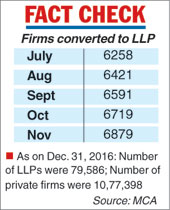
Calcutta: The trend to convert private companies to limited liability firms continues unabated despite the government's attempt to make it harder to get tax benefits associated with such a move.
Data from the ministry of corporate affairs show a month-on-month rise in such conversion (see chart) even as an amendment made in the Income Tax Act during the 2016 Budget sought to discourage it with the imposition of a capital gains tax beyond a threshold.
Corporate lawyers underline several benefits associated with the conversion both in terms of tax and compliance.
While the Companies Act, 2013 governs companies in the public and private spheres, LLPs are regulated by the Limited Liability Partnership Act, 2008. The compliance burden on the companies under the Companies Act is substantially more than the LLPs.
For instance, LLPs are not required to hold annual general meetings like their company counterpart or appoint independent directors and auditor when they reach a certain size (capital base of Rs 10 crore and above). Firms do not have to appoint company secretaries or set up committees such as for remuneration.
Moreover, LLPs are more tax efficient as they are not subjected to dividend distribution tax and minimum alternative tax while taking out profits.
"LLPs are becoming increasingly popular among corporate houses. There is also a visible trend converting private companies to LLP," Debanjan Mandal, partner of Fox & Mandal, said. LLP is also gaining currency when a corporate house wants to execute a project. "Once the project is over, profit can be taken out and the LLP dissolved," he said.
N.G. Khaitan, partner of Khaitan & Co, said carrying out business by LLP is a global trend. He urged the government to promote such firms with proper regulatory framework and tax incentives.
However, an amendment disclosed in the Finance Bill of 2016 had only queered the pitch for the conversion of private companies to LLPs.
Previously, such conversions were not treated as "transfer" and hence not liable to capital gains tax if the turnover was up to Rs 60 lakh. From the assessment year 2017-18, a limitation was introduced. The asset base would have to be below Rs 5 crore for a tax neutral transfer.
"This impacted the conversion of many holding companies. While they may not have large turnover, these holdcos had large asset (shares of operating firms or immovable assets such land and buildings," said Asim Choudhury, principal associate, Khaitan & Co.










